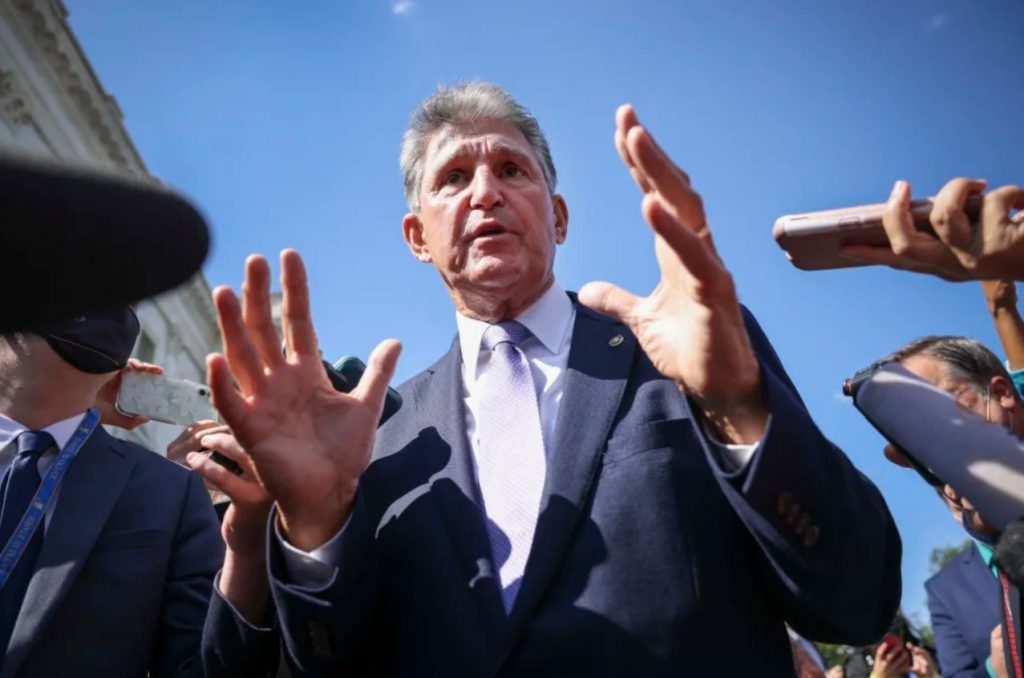
Sen. Joe Manchin says he will make a deal with his own Democratic party on a spending bill, but only if the Federal Reserve begins pulling back on its monetary stimulus to the economy.
In a signed agreement with Senate Majority Leader Chuck Schumer (D-N.Y.), Manchin said he would only support a budget resolution with a top-line number of $1.5 trillion, with no funds in the new legislation disbursed until after all COVID-related federal spending is exhausted.
Another condition: The “Federal Reserve ends quantitative easing,” referring to the central bank’s efforts to prop up the economy through asset purchases. Through QE, the Fed is currently buying about $120 billion a month in U.S. Treasuries and agency mortgage-backed securities.
Politico first reported the agreement, which was dated July 28, 2021 but has been circulating in recent days to reiterate Manchin’s stance on the spending debate.
Manchin has been fixated on the Fed’s easy money policies as readings on inflation surged through the summer. In August, Manchin penned a letter to Fed Chairman Jerome Powell blaming the pace of rising prices to the Fed’s asset purchases.
“I am deeply concerned that the continuing stimulus put forth by the Fed, and proposal for additional fiscal stimulus, will lead to our economy overheating and to unavoidable inflation taxes that hard working Americans cannot afford,” Manchin wrote.
Manchin’s concerns with QE extend as far back as 2013, when he voted against Janet Yellen’s nomination for Fed Chair on the basis that she didn’t support “a limit nor a desire to back off” the post-financial crisis QE program.
It is unclear how Congress would actually go about forcing the Fed to start slowing its QE program, but any efforts to do so may be moot given the central bank’s messaging that it will likely announce its intention to do so in just a little over a month.
Fed officials have been hinting at a “tapering” of its quantitative easing program for months, and Powell said on Sept. 22 that an official announcement could come as soon as the first week of November.
‘These are not things we control’
Manchin has tied his concerns over QE to his desire for a spending bill with a smaller price tag than his more progressive colleagues are aspiring for.
“My top line has been $1.5 [trillion] because I believe in my heart that what we can do and with the needs we have right now and what we can afford to do without basically changing our whole society to an entitlement mentality,” Manchin said Thursday.
Although Manchin has pointed to inflation as a consequence of pandemic-era government spending and the Fed’s money printing, the Fed itself has attributed high inflation readings to “transitory” factors. One example: a shortage in chips that has constrained new car production and contributed to surging used car prices.
“These are not things we control,” Fed Chairman Jerome Powell told Congress in testimony on Thursday. “We don’t control the supply of semiconductors.”
Manchin’s comments come as lawmakers simultaneously attempt to deal with a debt-ceiling crunch that could see the Treasury running out of money to pay the government’s bills. The U.S. Treasury, which has had to tap into “extraordinary measures” while the debt ceiling ties its hands on new debt issuance, estimates it could miss payments to U.S. debt holders by Oct. 18.
For a Senate that is split 50-50 between Democrats and Republicans, Manchin’s vote is critical for the White House.
But the administration has maintained that it’s critical for Congress to move quickly.
“It would be catastrophic for the economy and for individual families,” Treasury Secretary Janet Yellen told Congress, alongside Powell. She said social security payments and paychecks to service members could be delayed past Oct. 18.